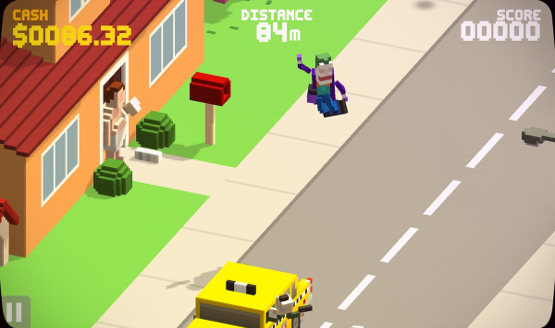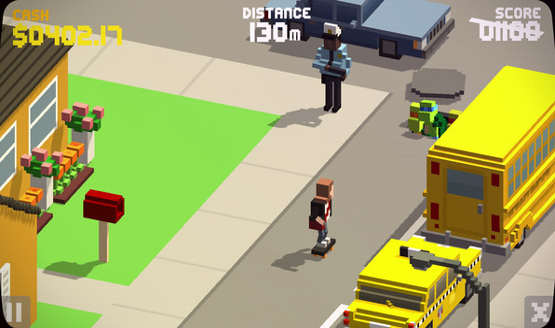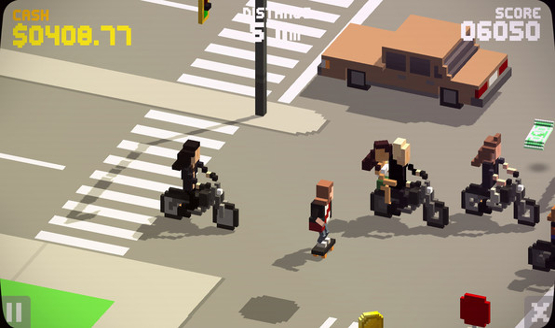
I’ll admit it upfront: I am a nerd. And due to that fact, anything that even remotely resembles a beloved IP from my childhood years is going to tip the scales of my bias. PixelTrip Studios’ The VideoKid, on its surface, is the Star Wars of nostalgia. But does it offer more than a trip down nostalgia lane, or is it simply a collection of the greatest characters and films and one-liners from the golden generation that is the 1980s? Actually, that doesn’t sound too bad.
Indiana Joker: Terminators of the Lost Karate Kid
The VideoKid is simply an endless runner that features the titular Video Kid and his quest to deliver videos to other kids on an endless block somewhere in 1980s America. All the while you try to avoid crashing into your favorite 80s characters and vehicles by zipping past them at different speeds and engaging your arsenal of gadgets or simply pulling a 360 ollie heelflip over them. The only issue is that you can’t actually do a 360 ollie heelflip, but you can jump on a rail and grind it for a second. Oh, and you don’t control your speed or the ability to use gadgets besides a super jump and fast-throw ability that end up being kind of useless. Especially when the limited times for the limited set of power ups are probably as a result of the truncated map size and its singular nature.
The VideoKid is very limited when it comes to that all important aspect of video games that we call “interaction.” You can also call it gameplay or simply refer to it is a player’s toolset, but none of those technicalities would cover up the fact that The VideoKid is far more appropriate in a mobile games setting that is made for titles with this lack of control. To make matters simpler—because why not?—outside the endless running and crashing, the player is only presented with three additional moves to purchase alongside a handful of skins. At least you don’t have to use real money to purchase these moves and skins, as gold and silver skins are thrown everywhere for the Video Kid to pick up.
Speaking of collecting coins, the rules of the game seem to be a little unfair at first glance. I was sure that when a police car or a mob of greasers from The Outsiders barged onto the screen in a lane that was covered with coins, there was actually no possible way of getting said coins. This dark thought had me question other moments in the adventure on my quest to meet Jessica at the end of the road. Who is Jessica? An objective marker. Now, even if there are ways to achieve these feats that I am totally oblivious to, it requires a certain level of trial and error that becomes quite annoying when these instances occur three minutes into a run, which is a long time when you have to get back to that same position.
But I suppose that is the magic of these types of high-score addicted games. You find the fun! In its simplistic nature, at some point I just threw out the need to reach Jessica—although if it had been Ripley, Firestar, or any other 80s character, that’d be a different story—and just decided to see how much I could cheat, manipulate, and push the game to its technical and mechanical limits as to what exactly constituted a GAME OVER screen.
Back to the Past
And that’s when The VideoKid became one of my favorite games of the generation. Apologies for the blunt segue, but what truly matters in a $5 indie pickup like The VideoKid is the little things. I would be remiss to spoil any amount of character reveals in the game, so trust me when I say that the sheer joy you will feel when you see your favorite childhood TV shows and movies on-screen and interacting with your character in the game’s world is nothing short of spellbinding. And that’s just the first time!
As you progress further and further down the block, the game’s programming knows to throw more characters at you, specifically those you haven’t encountered in the early portions. The first time I got to the end-game, I immediately crashed because of how distracted I was by the sheer amount of nostalgia on-screen. And it’s not just an inanimate, barely recognizable character model that you’ll come across. Every character and vehicle has unique animations, sound effects, and lines that had me scratching my head as to how the developers were able to avoid class-action lawsuits.
It’s something you have to see to believe and it’s more than worth it to have to sit through the game’s shortcomings in order to reach these moments of childhood bliss. But with every moment of ecstasy comes a point of critique, like how the random generation of the map isn’t really that random. Each quarter of the game hits the same beats, with the bits in between being the only things that can be classed as randomly generated. You’re going to see the same park bench and the same traffic jam in the early parts, the same neighborhoods and obstacles in the middle section, and the same raucous battle in the final stretch.
And while the quest for high scores is always addicting, you’re going to learn exactly when you need to spam the throw button or in what moments you can afford to grind multiple rails. Without the backdrop of nostalgia, The VideoKid would be a truly forgettable game. That it is only saved by its licenses was enough for me to extract a certain amount of enjoyment, but it probably won’t be for those not versed with the characters of 1980s Hollywood. In the end, I would only recommend the game to those that feel the need, the need for speed!
(I cannot confirm the existence of a Top Gun Easter egg or character appearance in the game because I did not watch the movie, but I can say that, on behalf of PixelTrip Studios, Tom Cruise’s likeness was nowhere to be found in case any lawyers are reading this.)
The VideoKid review code provided by publisher. Version 1.00 reviewed on PS4 Pro. For more information on scoring please see our Review Policy here.
-
Pure nostalgia trip
-
Attention to detail
-
No lasting appeal
-
Simple mechanics
The VideoKid Review
-
The VideoKid ET
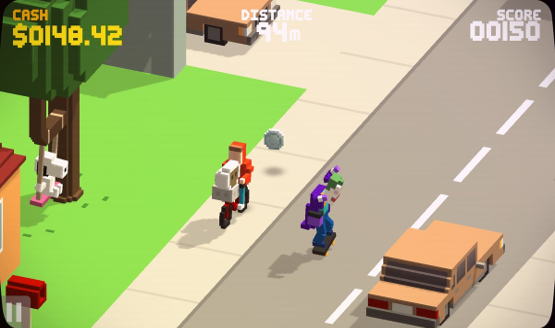
-
The VideoKid Opening
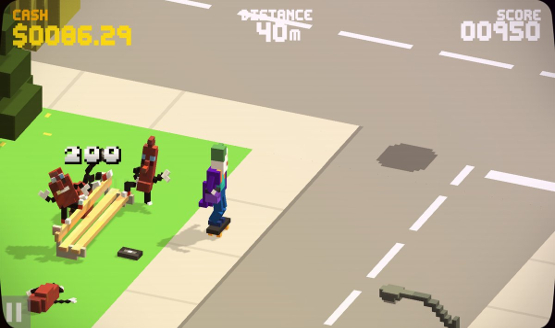
-
The VideoKid Pac-Man
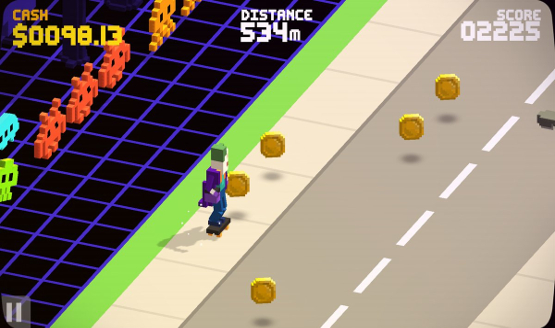
-
The VideoKid Peanuts
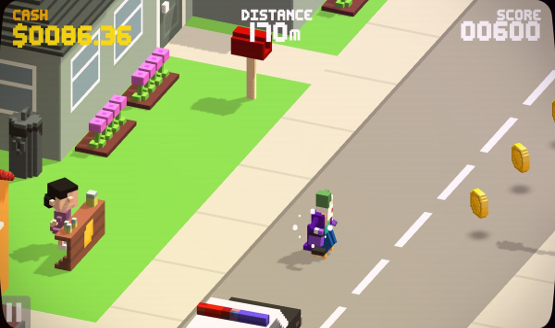
-
The VideoKid TMNT Sewers
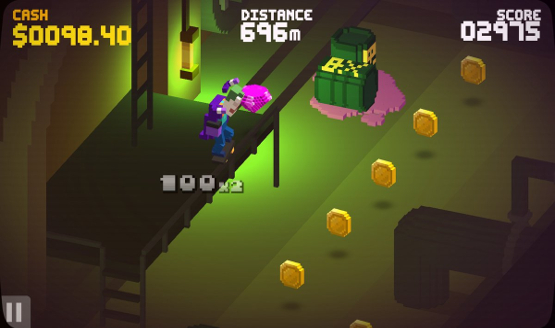
-
The VideoKid Targets
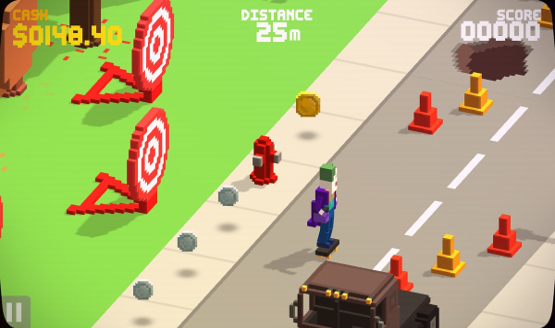
-
The VideoKid Transformers
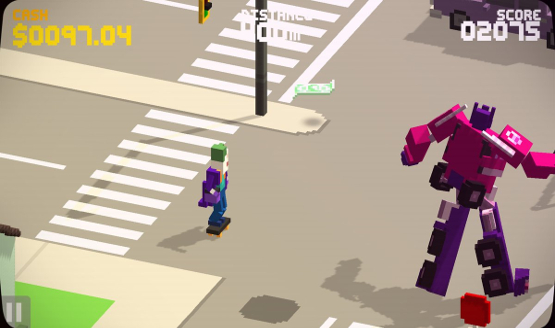
-
The VideoKid Trick
